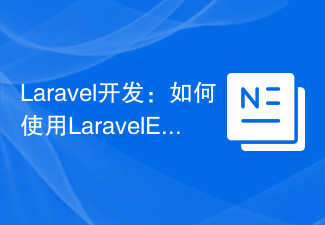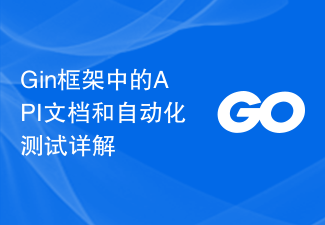 Backend Development
Backend Development Golang
Golang Go language development essentials: 5 popular framework recommendations
Go language development essentials: 5 popular framework recommendations
"Go language development essentials: 5 popular framework recommendations"
As a fast and efficient programming language, Go language is favored by more and more developers favor. In order to improve development efficiency and optimize code structure, many developers choose to use frameworks to quickly build applications. In the world of Go language, there are many excellent frameworks to choose from. This article will introduce 5 popular Go language frameworks and provide specific code examples to help readers better understand and use these frameworks.
1. Gin
Gin is a lightweight web framework with fast routing functions and rich middleware support. It is one of the most popular web frameworks in the Go language. The following is a simple Gin example:
package main
import "github.com/gin-gonic/gin"
func main() {
r := gin.Default()
r.GET("/", func(c *gin.Context) {
c.JSON(200, gin.H{
"message": "Hello, World!",
})
})
r.Run(":8080")
}In this example, we created a basic Gin application to return a JSON data.
2. Beego
Beego is a high-performance Web framework that provides MVC mode support, ORM and other functions. Here is a simple Beego example:
package main
import (
"github.com/astaxie/beego"
)
type MainController struct {
beego.Controller
}
func (c *MainController) Get() {
c.Data["json"] = map[string]string{"message": "Hello, Beego!"}
c.ServeJSON()
}
func main() {
beego.Router("/", &MainController{})
beego.Run()
}This example shows how to define a controller in Beego and return JSON data.
3. Echo
Echo is a fast and minimalist web framework suitable for building RESTful APIs. Here is a simple Echo example:
package main
import (
"net/http"
"github.com/labstack/echo"
)
func main() {
e := echo.New()
e.GET("/", func(c echo.Context) error {
return c.String(http.StatusOK, "Hello, Echo!")
})
e.Start(":8080")
}This example shows how to define a route in Echo and return text data.
4. Iris
Iris is a high-performance web framework that provides many powerful functions and tools. Here is a simple Iris example:
package main
import "github.com/kataras/iris"
func main() {
app := iris.New()
app.Get("/", func(ctx iris.Context) {
ctx.JSON(iris.Map{"message": "Hello, Iris!"})
})
app.Run(iris.Addr(":8080"))
}This example shows how to define a route in Iris and return JSON data.
5. Buffalo
Buffalo is a rapid web development framework that integrates many useful tools and features. Here is a simple Buffalo example:
package actions
import (
"github.com/gobuffalo/buffalo"
"github.com/gobuffalo/envy"
)
func init() {
env := envy.Get("GO_ENV", "development")
app := buffalo.New(buffalo.Options{
Env: env,
})
app.GET("/", HomeHandler)
app.Serve()
}
func HomeHandler(c buffalo.Context) error {
return c.Render(200, r.JSON(map[string]string{"message": "Hello, Buffalo!"}))
}This example shows how to define a processing function in Buffalo and return JSON data.
Summary: The above are 5 popular Go language frameworks, each framework has its own characteristics and advantages. Through the use of these frameworks, developers can build efficient and stable applications faster. We hope that the code examples provided in this article can help readers better understand and use these frameworks.
The above is the detailed content of Go language development essentials: 5 popular framework recommendations. For more information, please follow other related articles on the PHP Chinese website!
 五个精选的Go语言开源项目,带你探索技术世界Jan 30, 2024 am 09:08 AM
五个精选的Go语言开源项目,带你探索技术世界Jan 30, 2024 am 09:08 AM在当今科技快速发展的时代,编程语言也如雨后春笋般涌现出来。其中一门备受瞩目的语言就是Go语言,它以其简洁、高效、并发安全等特性受到了许多开发者的喜爱。Go语言以其强大的生态系统而著称,其中有许多优秀的开源项目。本文将介绍五个精选的Go语言开源项目,带领读者一起探索Go语言开源项目的世界。KubernetesKubernetes是一个开源的容器编排引擎,用于自
 Go语言开发必备:5个热门框架推荐Mar 24, 2024 pm 01:15 PM
Go语言开发必备:5个热门框架推荐Mar 24, 2024 pm 01:15 PM《Go语言开发必备:5个热门框架推荐》Go语言作为一门快速、高效的编程语言,受到越来越多开发者的青睐。为了提高开发效率,优化代码结构,很多开发者选择使用框架来快速搭建应用。在Go语言的世界中,有许多优秀的框架可供选择。本文将介绍5个热门的Go语言框架,并提供具体的代码示例,帮助读者更好地理解和使用这些框架。1.GinGin是一个轻量级的Web框架,拥有快速
 Go怎么结合Gin导出Mysql数据到Excel表格May 26, 2023 pm 09:15 PM
Go怎么结合Gin导出Mysql数据到Excel表格May 26, 2023 pm 09:15 PM1、实现目标Golang使用excelize导出表格到浏览器下载或者保存到本地。后续导入的话也会写到这里2、使用的库gogetgithub.com/xuri/excelize/v23、项目目录go-excel├─app│├─excelize││└─excelize.go│├─model││└─sysUser.go│└─service│└─userService.go├─common│└─mysql.go├─go.mod├─go.sum├─main.go└─setting.json4、主要代码编写
 使用Golang的Web框架Echo框架实现分布式任务调度Jun 24, 2023 am 11:49 AM
使用Golang的Web框架Echo框架实现分布式任务调度Jun 24, 2023 am 11:49 AM随着互联网的发展和信息技术的进步,大数据时代已经来临,数据分析、机器学习等领域也得到了广泛的应用。在这些领域中,任务调度是一个不可避免的问题。如何实现高效的任务调度,对于提高效率至关重要。在本篇文章中,将介绍如何使用Golang的Web框架Echo框架实现分布式任务调度。一、介绍Echo框架Echo是一个高性能、可伸缩、轻量级的GoWeb框架。它基于HTT
 Laravel开发:如何使用Laravel Echo和Pusher实现WebSockets通信?Jun 13, 2023 pm 05:01 PM
Laravel开发:如何使用Laravel Echo和Pusher实现WebSockets通信?Jun 13, 2023 pm 05:01 PMLaravel是一个流行的PHP框架,具有高度可扩展性和高效性,它提供了很多强大的工具和库,让开发者可以快速构建高质量的Web应用程序。其中,LaravelEcho和Pusher是两个非常重要的工具,通过它们可以很容易地实现WebSockets通信,本文将详细介绍如何在Laravel应用程序中使用这两个工具。什么是WebSockets?WebSockets
 PHP中echo关键字的作用和使用方法详解Jun 28, 2023 pm 08:12 PM
PHP中echo关键字的作用和使用方法详解Jun 28, 2023 pm 08:12 PMPHP中echo关键字的作用和使用方法详解PHP是一种广泛使用的服务器端脚本语言,它在网页开发中被广泛应用。而echo关键字是在PHP中用于输出内容的一种方法。本文将详细介绍echo关键字的作用和使用方法。作用:echo关键字的主要作用是将内容输出到浏览器。在网页开发中,我们需要将数据动态地呈现到前端页面上,这时就可以使用echo关键字将数据输出到页面上。e
 探索Go语言框架:5个不容错过的选择!Feb 19, 2024 pm 02:29 PM
探索Go语言框架:5个不容错过的选择!Feb 19, 2024 pm 02:29 PMGo语言作为一种快速、高效的编程语言,一直受到程序员的青睐。在Go语言的生态系统中,框架扮演着至关重要的角色,帮助开发者更快速地构建应用程序。本文将介绍五个Go语言框架,让你了解其特点和用法。1.Gin框架Gin框架是一个轻量级的Web框架,具有快速、高性能的特点。使用Gin框架可以快速构建RESTfulAPI和Web应用程序。以下是一个简单的示例代码:
 Gin框架中的API文档和自动化测试详解Jun 22, 2023 pm 09:43 PM
Gin框架中的API文档和自动化测试详解Jun 22, 2023 pm 09:43 PMGin是一个用Golang编写的Web框架,它具有高效、轻量、灵活等优点,性能相对较高,并且易于使用。在Gin框架开发中,API文档和自动化测试十分重要。本文将深入探讨Gin框架中的API文档和自动化测试。一、API文档API文档用于记录所有API接口的详细信息,方便其他开发人员使用和理解。Gin框架提供了多种API文档工具,包括Swagger、GoSwa


Hot AI Tools

Undresser.AI Undress
AI-powered app for creating realistic nude photos

AI Clothes Remover
Online AI tool for removing clothes from photos.

Undress AI Tool
Undress images for free

Clothoff.io
AI clothes remover

AI Hentai Generator
Generate AI Hentai for free.

Hot Article

Hot Tools

Safe Exam Browser
Safe Exam Browser is a secure browser environment for taking online exams securely. This software turns any computer into a secure workstation. It controls access to any utility and prevents students from using unauthorized resources.

SAP NetWeaver Server Adapter for Eclipse
Integrate Eclipse with SAP NetWeaver application server.

SublimeText3 Chinese version
Chinese version, very easy to use

DVWA
Damn Vulnerable Web App (DVWA) is a PHP/MySQL web application that is very vulnerable. Its main goals are to be an aid for security professionals to test their skills and tools in a legal environment, to help web developers better understand the process of securing web applications, and to help teachers/students teach/learn in a classroom environment Web application security. The goal of DVWA is to practice some of the most common web vulnerabilities through a simple and straightforward interface, with varying degrees of difficulty. Please note that this software

Dreamweaver Mac version
Visual web development tools





